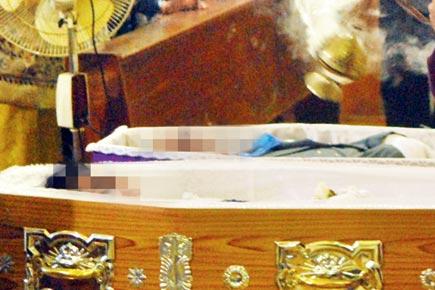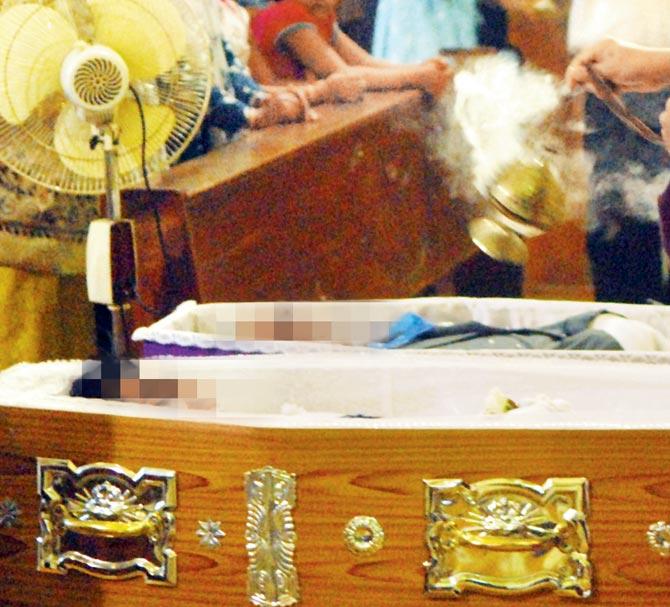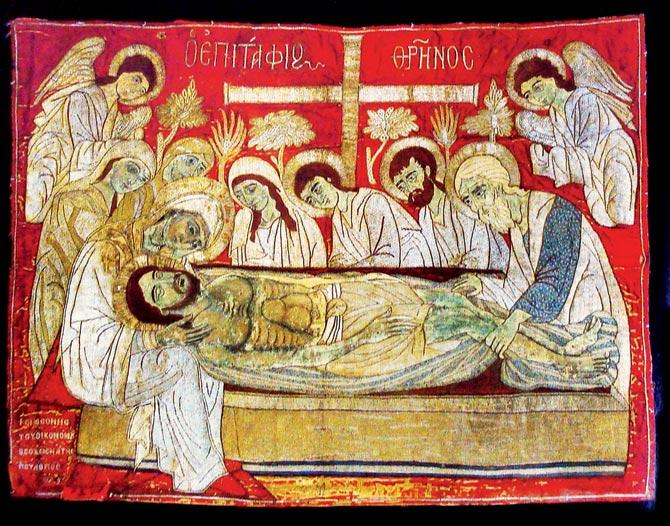Lack of space, environmental concerns have spurred the Archdiocese of Bombay to endorse shrouded burials, as Vasai belt takes the lead


Wooden caskets are a drain on the environment and take longer to decompose. File pic
If it was good enough for Jesus Christ, it’s good enough for you. Coffins have been integral to burials in the Christian community. But given the space crunch for burials in the city, the Archdiocese of Bombay began actively encouraging families this week to opt for burials in shrouds - a more economic and ecological alternative to the traditional wooden caskets.
ADVERTISEMENT

A depiction of the entombment of Jesus Christ (1599) in A Guide to the Benaki Museum, by Angelos Delivorrias. Pic/WIKIMEDIA COMMONS
In shroud burials, explains Father Nigel Barrett from the office of the Archdiocese of Bombay, the body is covered with cloth and buried, doing away with the need for a coffin. “It is an ancient practice of the Church. In fact, Christ was buried in a shroud.”
Coffins a Western concept
The Catholic Communication Centre of the Archdiocese of Bombay on January 10 released a video explaining the economic and ecological advantages of such a burial. It also demonstrated the use of a metal coffin as compared with wooden ones, procured by chopping trees. The video is being strongly pushed on social media platforms.
“Being buried in a coffin is a Western concept that has entered India. It has nothing to do with the Indian ethos. Shroud burials have a lot of advantages: they are eco-friendly, provide an alternative option to non-degradable wooden coffins, and take up less space,” says Father Barrett.
Dubbing coffins an “aristocratic approach”, he says it is the first time that the Archdiocese of Bombay is publicly encouraging shroud burials. “A number of priests from, various parishes all over the city have asked us to create awareness on shroud burials. We think it is easier if a central office (the Archdiocese of Bombay, in this case) issues a uniform communication, rather than individual bodies working in their own capacities, so that people can make informed decisions.”
He says the archdiocese only recommends shroud burials; it’s not a compulsion.
Why it’s better
Shroud burials are not alien to Mumbai Metropolitan Region. According to Father Allwyn D’Silva (68), secretary of climate change, The Federation of Asian Bishops Conference, Thane and adjoining areas warmed up to shroud burials nearly 15 years ago.
The parishes of Vasai took the custom up nearly a decade ago. The practice has gained momentum over the last six years. “Now, nearly 100 per cent of the parishioners opt for shroud burials,” says Father Rajesh D’souza (42) of St Joseph’s Church, Nalasopara, who has 2,500 parishioners under his wing.
“Shroud burials are more eco-friendly. It takes around three years for a body to decompose when it is buried in a coffin, whereas it takes around two years with a shroud burial. Also, we don’t need to cut down trees for wood to build coffins. Even the bodies - when buried without a coffin - decompose at a faster rate,” says Father D’Silva. “We are moving away from customs, but not from the faith and the teachings of the church.”
Terming shroud burials an “excellent” idea, Dolphy D’souza, former president and current executive member of The Bombay Catholic Sabha, says it’s easier on the pockets as well. Coffins go for anywhere between R4,000 and Rs 25,000. “Teak wood coffins go for over Rs 10,000.”
Too long a wait
She says the awareness push from the archdiocese should have come long ago. “People can become very competitive about the type of coffin they use to bury their loved ones in. Families cannot afford proper burials all the time. On the one side you have lost your beloved and on the other, you have to incur this heavy financial expense as well. Today, because of an ongoing burial space crunch, we have to move the deceased to as far as Sewri.”
She says burial rituals should adapt to the prevailing social conditions. “Historically, people were buried in shrouds. So, there is no deviation from our roots on that front.”
But, not everyone is enthused about the archdiocese’s recommendation. “If the church is really serious about shroud burials, then the priests themselves should lead by example,” says Archie Sodder, advocate and secretary of the Mumbai chapter of the Association of Concerned Catholics (AOCC). “But, you don’t see any priest or cardinal coming ahead and announcing that he wants to be buried in shroud. Why is that so? It’s one policy for the masses and one for the classes.”
Sodder alleges that the Church works hand in glove with undertakers and procures coffins for the deceased. “Priests are always in their (undertakers’) good books. There is no problem with a shroud, but a lot of poor people might not go for it out of fear of being looked down upon by others. They think of it (a coffin) as the last thing you can do for a deceased loved one. So, if the rich do it, the poor will automatically follow.”
Melwyn Fernandes, another AOCCâu00c2u0080u00c2u0088member, cautions that the recommendation is “easy to preach but difficult to practice”. “The archdiocese is selling land all over Mumbai and Thane to the BMC, but it is also citing environmental reasons for not using a coffin.”
 Subscribe today by clicking the link and stay updated with the latest news!" Click here!
Subscribe today by clicking the link and stay updated with the latest news!" Click here!







